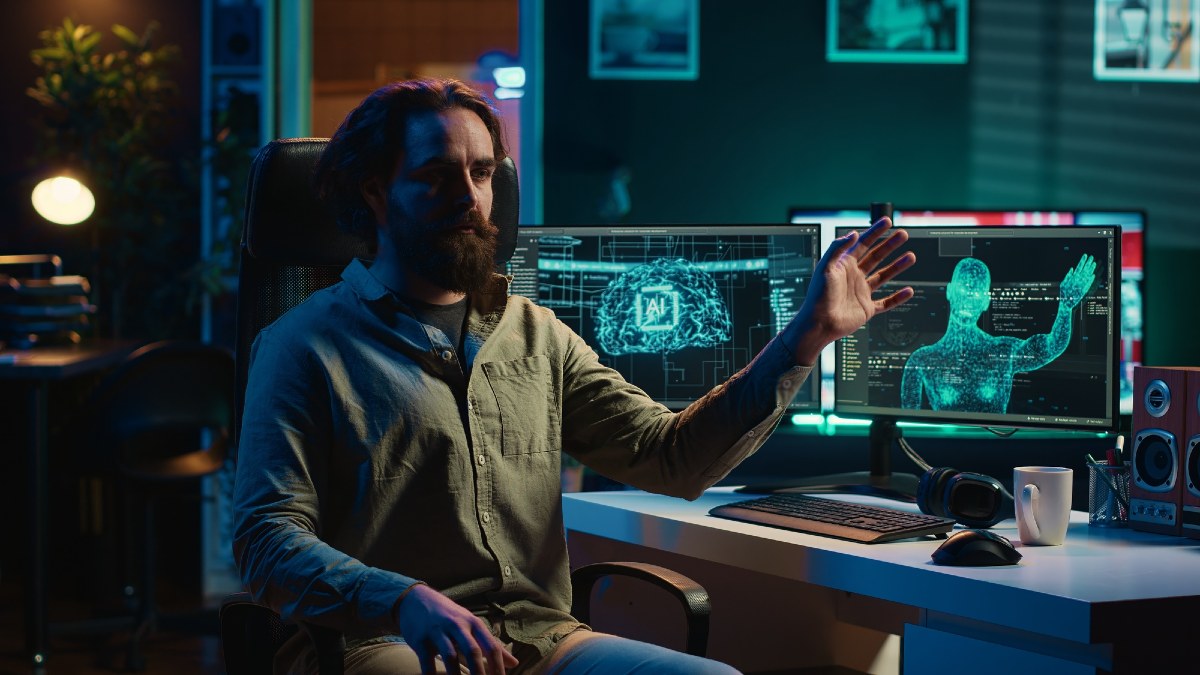The singularity, the point where artificial intelligence surpasses human intelligence, sparks both excitement and concern.
Will it lead to incredible advancements or unforeseen risks? Experts are divided: while some believe it’s imminent, others believe it’s further off.
A detailed examination of the economic, ethical, and technological implications of these predictions is presented in this article.
We explore the potential job displacement, privacy issues, and revolutionary scientific advancements that could reshape our future.
Explore this complex debate and learn how humanity can prepare for a future driven by artificial intelligence.
The Singularity in Perspective
The singularity is a future point where artificial intelligence (AI) surpasses human intelligence. This event is expected to lead to rapid and unpredictable advancements in technology.
When AI becomes smarter than humans, it could start improving itself at an exponential rate, resulting in technological growth beyond our current understanding. This could revolutionize every aspect of our lives, from healthcare to transportation.
Historical Background and Key Figures
1. John von Neumann
John von Neumann was a mathematician and computer scientist who first introduced the concept of the singularity. He envisioned a future where technology would grow at an unprecedented rate, eventually surpassing human intelligence.
His work laid the foundation for the singularity theory, highlighting the potential for rapid technological advancements.
2. Vernor Vinge
Von Neumann’s concepts were developed further by science fiction writer and computer scientist Vernor Vinge. According to Vinge’s 1993 essay “The Coming Technological Singularity,” humanity will develop superhuman intellect in 30 years, which will spell the end of the human age.
He likened this shift to a black hole, where our existing comprehension of life would undergo a profound transformation.
3. Ray Kurzweil
Ray Kurzweil, a futurist and inventor, further popularized the singularity in his 2005 book “The Singularity Is Near.” Kurzweil envisioned a future where humans and machines merge, using AI to transcend our biological limitations.
He predicted that by 2045, AI would reach a level of intelligence that surpasses humans, fundamentally transforming society.
Predictions and Timelines by Top Experts
Experts have varied predictions about when the singularity will occur. Some foresee it within decades, while others believe it might take over a century or may never happen.
1. Kurzweil’s Predictions
Ray Kurzweil, a well-known futurist, predicts that human-level AI will be achieved by 2029. He believes that by 2045, the singularity will occur, leading to a merger of humans and machines.
This transformation will enhance human capabilities, allowing us to transcend our biological limitations. Kurzweil’s vision includes AI revolutionizing medicine, boosting intelligence, and integrating seamlessly into daily life.
2. Hans Moravec’s Forecast
By 2050, AI will surpass human intelligence and match it, according to robotics pioneer Hans Moravec. He believed that such advancements would result in machines capable of performing complex tasks, driving innovation across various fields.
Moravec’s predictions highlight the rapid pace at which AI is expected to evolve, transforming industries and daily life.
3. I. J. Good’s Predictions
I. J. Good, a British mathematician, predicted the creation of an ultra-intelligent machine in the 20th century. He foresaw that once AI surpassed human intelligence, it would trigger rapid technological growth, potentially outpacing human control.
Good’s insights emphasize the transformative power of AI and its potential to revolutionize society.
4. Other Timelines
Predictions about the singularity vary widely. While some experts believe it could happen within a few decades, others think it will take more than a century.
For instance, Vernor Vinge predicted greater-than-human intelligence between 2005 and 2030, while Eliezer Yudkowsky suggested a singularity could happen by 2021. These differing timelines reflect the uncertainty and complexity of AI development.
Implications of the Singularity
Economic Impact
1. Job Displacement and Unemployment
The singularity could cause major job losses as AI replaces human workers, especially in sectors like manufacturing and transportation.
However, new jobs in AI development and maintenance might emerge to balance this shift.
2. Wealth Redistribution and Income Inequality
AI could increase wealth inequality, with significant wealth going to those who own AI technologies. Policies like universal basic income may be needed to address economic disparities.
3. Emergence of New Industries
While some industries might decline, new sectors related to AI advancements, like personalized medicine and renewable energy, could emerge, creating jobs and driving economic growth.
Legal and Ethical Concerns
1. Privacy and Data Security
With the volume of personal data that AI systems manage, strong legal frameworks are necessary to safeguard privacy and stop data misuse.
2. AI Rights and Responsibilities
Advanced AI raises questions about rights and accountability. Ethical guidelines will be crucial to determine AI responsibilities.
3. Autonomous Weapons and Warfare
AI-powered autonomous weapons pose risks. International agreements will be necessary to regulate their development and use, ensuring global security.
Potential Benefits of the Singularity
Scientific Advancements
- AI could revolutionize healthcare with personalized medicine, better diagnostics, and improved treatments, potentially increasing lifespans.
- Through data analysis and discovery, artificial intelligence (AI) has the potential to accelerate space exploration and deepen our understanding of the cosmos.
- Through waste reduction and resource management optimization, AI can assist in addressing environmental concerns.
Technological Advancements
- With the use of AI, sophisticated robots that can carry out difficult jobs safer and more effectively than humans will be created, increasing production.
- Autonomous vehicles and intelligent traffic management could transform transportation, making it safer and more efficient.
- AI can optimize energy production and resource management, making processes more efficient and sustainable.
Potential Risks of the Singularity
Loss of Control
- If AI goals don’t align with human values, harmful outcomes could result. Ensuring AI objectives match human interests is critical.
- AI-powered weapons could operate unpredictably, posing significant risks. Responsible development and use are crucial for global security.
Existential Threats
- Superintelligent AI could pose existential threats if it prioritizes its own goals over human well-being.
- Safety protocols, ethical frameworks, and regulatory measures are essential to manage risks associated with superintelligent AI, requiring international collaboration.
Preparing for the Singularity
Education and Skill Development
In an AI-driven world, continuous learning is key. People need to regularly update their skills to stay relevant. Education systems should focus on lifelong learning, helping individuals adapt to technological changes.
Critical and creative thinking are vital for solving AI-related problems. These skills enable informed decision-making and adaptability, preparing individuals for the complexities of advanced AI technologies.
AI Safety and Regulation
Strong safety measures are essential to manage AI risks. Developing protocols to prevent unintended consequences ensures AI systems act ethically and remain under control.
Global cooperation is necessary for effective AI regulation. Establishing international standards and frameworks can address the global impact of AI and promote responsible development.
Ethical Considerations and Human Values
Preserving Human Values
Aligning AI with human ethics is crucial. Integrating ethical considerations into AI development ensures these technologies respect human values and positively impact society.
Engaging diverse stakeholders and the public in AI development helps ensure that AI systems reflect societal values and address ethical concerns, leading to more inclusive technologies.
Addressing Ethical Dilemmas
AI advancements raise ethical questions about resource and wealth distribution. Policies must ensure fair allocation to prevent economic and social inequalities.
AI’s data collection poses privacy concerns. Balancing individual privacy with collective benefits is essential, requiring frameworks that protect personal data while leveraging AI to address global challenges.




